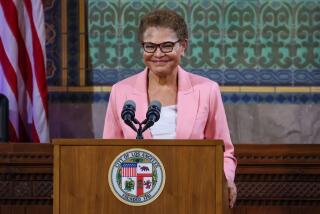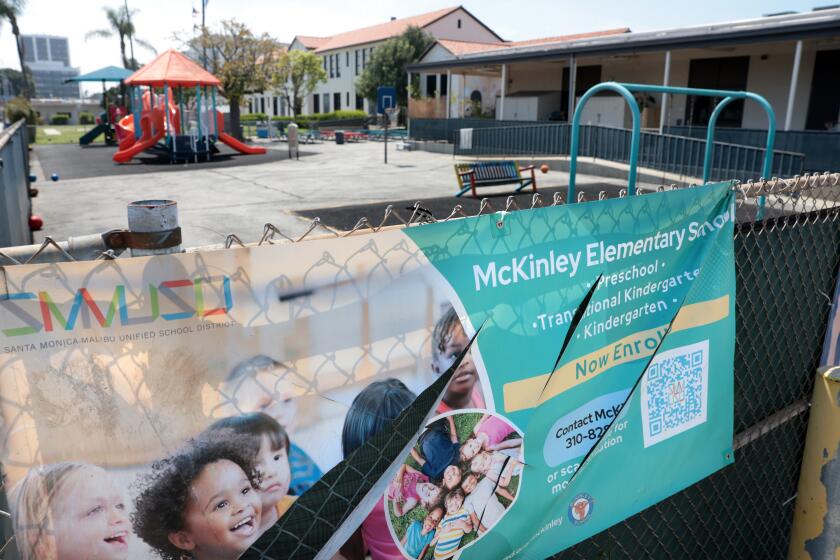Debate on Black Students Rages
There was nothing original about the teacher’s observations:
At Pasadena’s Muir High School -- as on many urban campuses -- black students are cited more often than others for disciplinary problems. And they score worse than others on standardized exams.
What was shocking was how the white teacher argued -- when he connected the dots with his public proclamation -- that unruly black students were responsible for his school’s failure to make the grade.
“It has absolutely nothing to do with teachers or curriculum,” Scott Phelps wrote in a letter to fellow teachers at Muir, warning that test scores were likely to nose-dive. “Standards of behavior, or the lack thereof” are to blame.
He didn’t hesitate to point the finger: “Overwhelmingly, the students whose behavior makes the hallways deafening, who yell out for the teacher and demand immediate attention in class, who cannot seem to stop chatting and are fascinated by each other but not with academics, in short, whose behavior saps the strength and energy of us on the front lines, are African American.”
Now, a month later, that letter continues ricocheting around the country, bouncing off assumptions about race, youth and social class.
Phelps’ letter resonated with many whites who feel threatened by the behavior of seemingly arrogant young black men. And it offended many blacks weary of being singled out for blame.
Those were the predictable reactions. Other responses were more nuanced, as the letter prompted finger-pointing, then soul-searching.
In newspaper columns, in private conversations, on talk radio, the “good” parents blamed the “bad” ones; teachers denounced other teachers.
At a forum in Pasadena, a teenager with bad grammar and a crude tattoo privately offered a thoughtful interpretation of her classmates’ self-destructive attitudes, while a bookish college student said to alarmed adults: “I’m sorry, but no one listens to you.”
And underneath their rancor and their hurt, many blacks felt an odd sort of gratitude.
At a neighborhood meeting about the letter, Kitty McKnight, a former teacher, exploded after a district official suggested that the solution to Muir’s discipline problems was more tolerance and commitment from teachers.
“I cannot sit and listen to this!” she shouted, rising from her seat. “Our boys are out of control.”
McKnight, who is black, graduated from Muir, sent her two now-grown sons there and recently retired after 40 years of teaching. “We have to do something,” she told the crowd. “We are losing our boys!” There was scattered applause in the black audience, but many sat in stunned silence.
Later, McKnight admitted that Phelps’ letter triggered feelings of anger and frustration, but also guilt.
“Having been a teacher all these years, I never made it a point. But it’s true. You talk to another black teacher about the behavior of black students and they know exactly what you mean. I feel like I’m at fault for not addressing it sooner.”
Others felt a sense of betrayal.
“I’m not saying it’s true or not true,” an angry father told a community meeting. “But it hurts to be held up to ridicule by someone whom we have entrusted our children’s minds to.”
It also hurts, Phelps said, to be labeled a racist for “simply making empirical observations of behavior that are totally supported by data.”
Phelps left a research program at Caltech to teach high school science 12 years ago. He is known by peers as a passionate critic of district officials, and a hard-working, dedicated teacher. He tutors physics students for free, invites kids over for family dinners, visits their homes to host study sessions.
“He’s not much of a public speaker or a disciplinarian, but he’s one of the best teachers I ever had,” said Muir alum Chad Hunter, who attends Pasadena City College and interns at Jet Propulsion Laboratory. It’s a job he got with Phelps’ help. “Mr. Phelps would do whatever it took to help, if you wanted to learn and you’re willing to work.”
Phelps says he never intended to insult black students. But many felt that his commentary, written in the dense style of an academic, had clear racial overtones. Black male teachers are better at controlling black students, he wrote, because they “have no trouble ‘going off’ on the kids.”
In conversation, Phelps offers a list of white, Latino and Asian American teachers he says left Muir because they were intimidated by aggressive black students.
“The cultures are so different, in order for white teachers to feel comfortable they have to put a lot of energy into changing the behavior of kids who are not like them,” he said.
It is Phelps’ attribution of misbehavior to cultural deficiencies that really rankles his critics.
“If children are disruptive, let’s say that. Let’s not say they’re disruptive because they’re black,” said Assistant Supt. George McKenna. “Some of these kids deserve credit just for showing up” at school, given their chaotic home lives and troubled neighborhoods.
More than a third of Muir’s 1,300 students live with single mothers, almost half are from families living below the poverty line, and almost 10% live apart from their families in county-run shelters or group homes.
Teachers who aren’t willing to accept that the stresses in children’s lives spill onto the campus “ought to be teaching in Beverly Hills,” McKenna said.
The fracas over the letter created such tension that Phelps was escorted off campus and put on two weeks’ paid leave -- not as punishment, district officials said, but for his protection. At the extremes, outsiders viewed him as either a martyr on the altar of political correctness or an example of racism infecting public education
“Sorry to hear about the terrible treatment you are getting from your high school,” e-mailed Joe Owens from England. “Can’t people speak the truth now days.... Everyone in education will say the same, but don’t have the guts to say it in public.”
An e-mail posted on a message board aimed at black women took this view: “It’s ironic that ad campaigns are jamming the idea into our children’s minds that everyone is alike, only to have this idiot magnify inferiority complexes that they already feel.”
For some, the debate has less to do with the message than the messenger.
Would the uproar have been the same if Phelps had been black? Probably not, said USC professor Todd Boyd, who studies race, culture and communication.
Consider African Americans a family, Boyd said. Phelps was “out of place” in speaking so bluntly. “It’s one thing for a member of your family to scold you. That comes from a history of love and support, knowledge and understanding,” he said. “You take that comment differently if it comes from someone off the street.”
Even among those who agreed with Phelps, many bristled at the media attention his letter drew. “It plays to the image of black people not caring,” Boyd said. “It’s not like we’ve been silent about kids misbehaving.... We just haven’t broadcast it on TV.”
Discipline problems aren’t confined to streetwise black children. Foul language, fistfights and sexually provocative behavior happen on campuses across the nation.
“It’s cultural, and I mean American culture,” said Pasadena High School teacher Lisa Newton. “I remember my son at 7, turning on the television and seeing Bart Simpson and how he had such a lack of respect for authority. These kids are emulating music videos, TV shows, MTV.”
And their parents, said retired teacher McKnight. “I called a mother and said, ‘Your son is not acting in an appropriate manner in class,’ ” she recalled. “And she started in right away, ‘My son told me about you. I know you’re black, but you’re prejudiced against him.’ ”
National studies of school disciplinary records going back more than 25 years show black youths are punished more often and more harshly than other students, but for less-serious and more-subjective offenses.
“The more active and physical style of communication that characterizes African American adolescents ... may be interpreted as combative or argumentative,” suggests research by a University of South Florida professor.
Some teachers put a positive spin on the cultural differences.
“Yes, the black kids are noisier, but so are the Greeks, the Italians,” said Hannah Naiditch, who was raised in Europe and spent 14 years teaching science in Los Angeles before retiring in 1984.
“The black kids were not as easily intimidated.... But that’s what made teaching so interesting. Then we weren’t so obsessed with all this high-stakes testing; you could use a little creativity.”
Today, most teachers say they don’t have that luxury. They say the pressure to produce on standardized tests requires students to move in lock-step, putting them under the gun and frustrating struggling students.
And sometimes disruptive behavior masks anxiety and fear.
“We’ve got kids with fifth-grade reading skills, and we’re trying to teach them algebra,” said Newton. They feel like academic failures, so they shift attention to their social strengths by cutting up in class, bullying other kids. “They’re angry. They’re drowning. But we save them at the expense of how many other students?”
That’s the question Phelps’ letter also raised when he condemned Muir’s “horrible” ninth-graders for “bouncing off the walls ... chasing each other through the hallways, into classrooms, yelling at the tops of their lungs.”
That would have been Velta Strouble, 30 years ago. She got kicked out of Muir in 10th grade for cutting classes and being disruptive, but straightened up and went on to earn two master’s degrees.
Now she’s an educational consultant and the mother of two boys who have generated more than their share of calls from Muir for fighting or mouthing off in class. Her boys are smart, but they are also boisterous and occasionally unruly, just as their mother was, she said.
“But that’s no reason to give up on them,” she added. “I know that teachers are frustrated, but every child is not going to fit the ‘perfect student’ mold.”
Teachers say they’re not asking for perfect students. They would settle for teenagers who don’t saunter into class 30 minutes late, interrupt a test with a request to borrow lip gloss, or curse them out in the middle of a lesson.
What teachers would like includes smaller classes, better academic preparation in elementary school and more vocational programs to broaden the choices for unconventional children. And a way of convincing parents that success in school ought to be a priority.
“When I drop my son off at school, I see kids showing up with no backpacks, no books. You know they’re not serious about education,” said Johari DeWitt-Rogers, a Muir parent.
“In the same way this teacher’s letter galvanized people to come forward and protest his statements, we’re going to have to get the community to rally together and turn things around, to say this is not acceptable for our young people.”
More to Read
Start your day right
Sign up for Essential California for news, features and recommendations from the L.A. Times and beyond in your inbox six days a week.
You may occasionally receive promotional content from the Los Angeles Times.






